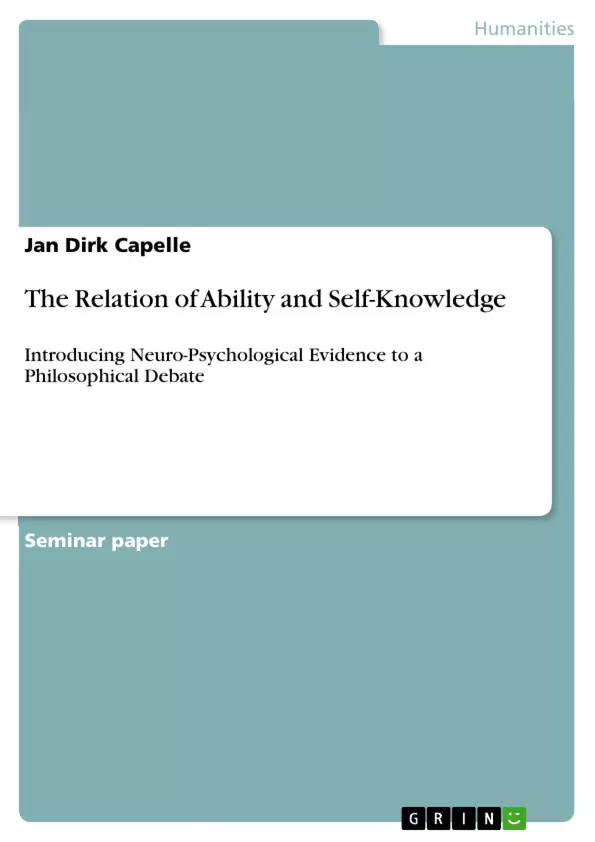The Essay discusses the relevance of Wittgensteinian arguments to the contemporary externalism-internalism debate on mental states as argued by William Child in his 2006 essay "Wittgenstein’s externalism: Context, self-knowledge and the past."
Child's central claim considered in the essay at hand is that certain types of abilites (such as mastery of a language and calculating) require self-knowledge of same sort, while others (such as swimming) do not - a point that has also been made by Michael Dummett.
Drawing on case studies provided by Hans J. Markowitsch (including the famous patient E.D.), it is argued that this claim does not hold against the indication of empirical evidenve and the dissociation of memory systems and therefore the impact of Wittgenstein's thoughts on the debate remains unproven.
Inhaltsverzeichnis (Table of Contents)
- Introduction and Structure
- The Philosophical Debate on States of Mind
- The Wide Context: Externalism vs Internalism
- The Narrow Context: William Child and Wittgenstein's Externalism
- Introducing a Neuro-Psychological Evidence
- Patient E.D.: A Case Study
- The Dissociation of Memory Systems in Neuro-Psychology
- The Translation of Terminologies
- Discussion
- Relevance of the Evidence
- Impact on the Debate
- Summary
Zielsetzung und Themenschwerpunkte (Objectives and Key Themes)
This essay aims to demonstrate the possibility of possessing knowledge of a language without being aware of it, using neuro-psychological evidence to challenge the philosophical argument that such a scenario is impossible. It then examines the impact of this evidence on the debate between internalism and externalism in philosophy of mind.
- The relationship between ability and self-knowledge
- The philosophical debate between internalism and externalism
- Neuro-psychological evidence regarding memory systems
- The case of patient E.D. and his unexpected ability to understand Italian
- The implications of this evidence for the philosophical debate
Zusammenfassung der Kapitel (Chapter Summaries)
- Introduction and Structure: The essay introduces the topic of possessing an ability without self-knowledge, specifically in the context of language comprehension. It outlines the two main goals: to demonstrate the possibility of this scenario and to examine its impact on the debate between internalism and externalism. The structure of the essay, which focuses on providing philosophical background and then introducing neuro-psychological evidence, is explained.
- The Philosophical Debate on States of Mind: This chapter offers a concise overview of the debate between internalism and externalism in philosophy of mind, focusing on the concept of mental states and their dependence on context. It then delves into William Child's argument for Wittgenstein's externalism, highlighting his claim that certain abilities, like language and mathematics, cannot exist without conscious awareness.
- Introducing a Neuro-Psychological Evidence: This chapter presents the case study of patient E.D., who lost significant portions of his personal memory but retained the ability to understand Italian. The chapter then explores the dissociation of memory systems in neuro-psychology, specifically the distinction between semantic knowledge (knowledge of words and grammar) and episodic memory (knowledge of personal experiences).
- Discussion: This chapter examines the relevance of the neuro-psychological evidence to the debate. It discusses the impact of this evidence on Child's argument for the impossibility of possessing an ability without self-knowledge.
Schlüsselwörter (Keywords)
The key concepts explored in this essay include: internalism, externalism, philosophy of mind, states of mind, self-knowledge, ability, language comprehension, neuro-psychology, memory systems, semantic knowledge, episodic memory, patient E.D., Wittgenstein, Child.
Frequently Asked Questions
Can someone possess an ability without being aware of it?
The essay argues that neuro-psychological evidence shows it is possible to have an ability, like language comprehension, without conscious self-knowledge.
Who is patient E.D. and why is he significant?
Patient E.D. is a case study of a man who lost his personal (episodic) memory but unexpectedly retained the ability to understand Italian, demonstrating a dissociation between ability and self-knowledge.
What is the philosophical debate between internalism and externalism?
Internalism suggests mental states are determined by factors internal to the person, while externalism (like Wittgenstein's) argues they depend on the external context and environment.
What was William Child's claim regarding abilities?
Child claimed that certain abilities like language require self-knowledge, whereas physical abilities like swimming do not. The essay challenges this distinction using empirical evidence.
What is the difference between semantic knowledge and episodic memory?
Semantic knowledge involves general facts, words, and grammar, while episodic memory involves personal experiences and events. The dissociation of these systems is key to the essay's argument.
- Quote paper
- Jan Dirk Capelle (Author), 2011, The Relation of Ability and Self-Knowledge, Munich, GRIN Verlag, https://www.grin.com/document/195197



